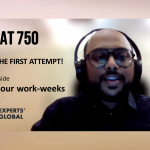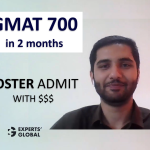Verbatim
Experts’ Global: Hi Akash, thank you for taking out the time to talk with us today! Could you kindly share your story in your own words?
Akash: I completed my undergrad in Chemical Engineering, and worked at General Electric for seven years as a sales and business development manager. Just before the pandemic hit India, I decided to take the GMAT and pursue an MBA to boost my career growth. The lockdown induced in India by COVID-19 meant that I used the Experts’ Global GMAT online course for my studies. Going on to secure a GMAT 700, I applied to several European and Canadian business schools and secured admits to the Schulich and Manchester MBAs respectively. As the Manchester curriculum fit better with my post-MBA goal of entering consulting, I picked the said MBA!
Experts’ Global: In your opinion, what factors made the difference in your success?
Akash: Usually, Indian candidates are great at Quant, whereas Verbal is not a strong suit of ours as we are not native English-language speakers. This meant that I focused on building up my Verbal skills more than I did on consolidating my knowledge of Quant. On the actual GMAT, I ended up scoring more on the Verbal section than I did on the Quant one!
Experts’ Global: With the benefit of hindsight, what mistakes did you make in the process?
Akash: For the GMAT, most candidates only focus on a few aspects. They focus on things such as Sentence Correction and Critical Reasoning but often fail to give due importance to the Reading Comprehension section. However, Reading Comprehension is the bulk of the Verbal section, and needs proper attention. Further, for Quant, most candidates focus mostly on formula-based questions that are easily solvable under time pressure. This often leads to lesser attention being paid to other Quant sections.
Experts’ Global: Regarding GMAT preparation, what advice do you have for future applicants?
Akash: Make sure to use a good quality set of mocks to test your readiness before you take the GMAT. Many mock test series vendors offer a free GMAT mock test that you can use to judge their offering’s worth. It is better to use a single set of prep resources to get your fundamentals in place and then start solving practice questions from a variety of sources. Around two months before your GMAT is scheduled, start taking mocks for the full three-and-a-half-hour duration of the exam to get yourself used to the exam-day context.
Experts’ Global: In your opinion, what number and frequency of mocks should a GMAT aspirant attempt?
Akash: An aspirant’s level of preparedness should dictate how many mocks one takes. When I was just starting off with mastering the syllabus concepts, I used to take one mock every fifteen days. My use of the GMAT practice tests really swung into full steam after my initial studies were done, and by a fortnight before the GMAT, I was taking one mock every two days.
Experts’ Global: What would you like to say about your lessons from managing the application timeline?
Akash: It is very important that you begin most of your application in September itself, assuming you are applying in round one of the MBA admissions process. In my case, I began my GMAT prep in March, and took the exam as well as worked on my applications in September. More wisely, candidates should begin preparing for the GMAT by January so that it can be taken by June, leaving them with two to three months to work on their application materials. The application journey also taught me that being authentic in writing your essays is absolutely necessary!
Experts’ Global: How was your MBA interview experience?
Akash: I applied to four business schools and got interview calls from all four. All the interviews were very conversational and were focused on finding out my motivations for an MBA, as well as how it would allow me to grow as an individual. My MBA interview prep had me well-equipped to tackle these questions, and I had done the important bit of reaching out to current and former students from my targeted schools to get their insights as well beforehand!
Experts’ Global: What can you tell us about your MBA experience thus far?
Akash: The Manchester MBA has been quite hectic! I chose the 15-month-long MBA, and in my very first term, I got to work on a live consulting project to design a product strategy and marketing materials for a client. Group work was also a major focus in the MBA, due to the constant focus on team growth. The peer group at Manchester is quite diverse, with a hundred students from around 35 different nations. Overall, it has presented me with a wonderful learning curve!
Experts’ Global: How has your job search during the MBA been and what advice do you have for future students on the same?
Akash: In India, most colleges have on-campus placement drives that make finding a job relatively straightforward. For MBAs outside India, your job search depends on how good you are at networking. For the first few months of the MBA, research the various fields that you wish to build a career in, speak to peers with relevant experience in the said field, and engage with similarly located alumni as well.
At Manchester, we get an internship prior to entering a job. Even finding an internship depends on the quality of your network. Considering post-MBA life too, the relationships you build in business school will prove useful in your later years!
Experts’ Global: What mistakes would you advise other GMAT and MBA applicants to avoid?
Akash: Look beyond the rankings alone when selecting your targeted business schools. Consider a school’s curriculum, location, and recruitment history to see if it fits with your profile and post-MBA ambitions. Further, do not just focus on the GMAT as the single defining factor of your admissions success. Indians, in general, score well on the GMAT, and business schools outside India look for the extracurricular achievements and life experiences of a candidate rather than their academic caliber alone. Try and build a personable outlook to excel in your MBA interview as well.
Experts’ Global: What is your final word to MBA aspirants out there?
Akash: Taking the GMAT and completing your applications will take you a stressful six to seven months in total. Make sure to sleep well before you take the GMAT. Also, in the interest of complete preparedness, reaching out to an MBA admissions consultant is advisable. None of us knew that COVID-19 was going to do what it did to the world before it happened. In exigencies, it is advisable to have a backup plan to rely on. Getting experienced help through the application gauntlet can help you formulate such alternative routes!
Experts’ Global: Thank you for interviewing with us today, Akash, and we are sure that your words will prove useful for our readers!
Akash: Thank you as well, and I am glad to take this interview as Experts’ Global’s aid was so useful to me!







